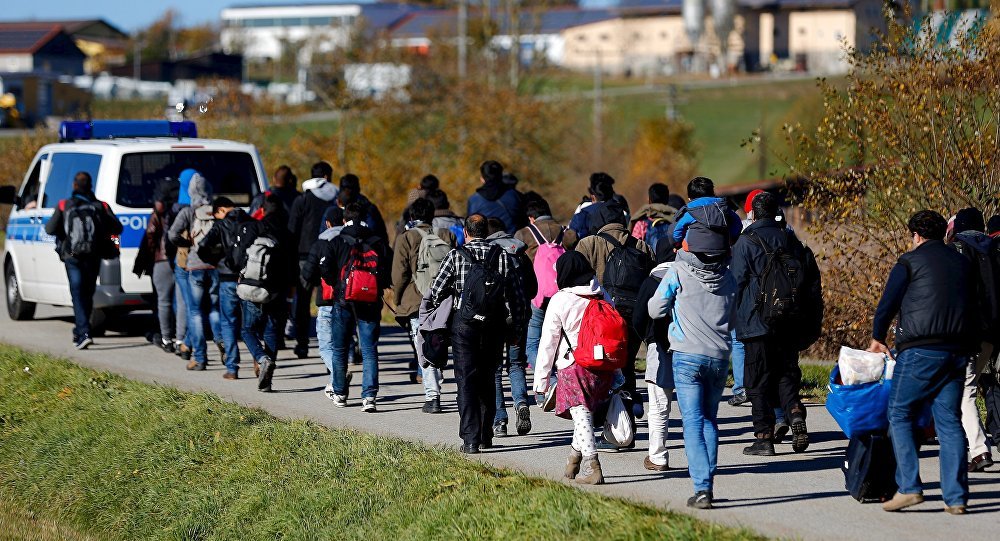Austria-Germany dispute over immigration crisis

TEHRAN - The differences between the two countries of Germany and Austria over the immigration crisis have entered a new phase. This difference was evident during the recent visit of the Chancellor of Germany, "Angela Merkel" and the Austrian Chancellor "Sebastian Kurz".
Although the Chancellors of Germany and Austria emphasized the need for the expansion of cooperation between the two countries, the attention of the media and analysts was related to the fundamental differences between Berlin and Vienna on the resolution of the immigrant crisis.
The crisis of immigration has now become a wide-spread crisis in the United Europe, an issue that shows itself even in the internal policies of Germany. Obviously one of the main reasons for the extremist party of "Alternative for Germany" entering the country's parliament has been the dissatisfaction among German citizens as a result of Angela Merkel and Christian Democrats' open policies regarding the issue of immigration. In the 2017 Austrian election campaign, the far-right Freedom Party has been able to attract many proponents through a massive maneuvering on the immigration crisis and maneuvering on nationalist doctrines in the Austrian political and social atmosphere.
Right now, the right-wing extremists in Austria (the Freedom Party), along with the People's Party (led by Kurz), have formed a coalition government. Obviously, in the near future, we'll witness more tensions between Vienna and Berlin over the crisis of immigrants. Of course, Austria doesn't intend to retreat from its policies in contradiction to the United Europe's plans regarding immigrants. Austria, along with countries like Hungary, doesn't intend to participate in the joint European project (on resolving the crisis of asylum seekers and refugees). This will exacerbate the conflicts between the European countries over the crisis of asylum seekers. However, the issue does not end there!
Austria is scheduled to hold the Presidency of the European Union in the second half of 2018. Without a doubt, this six-month period will be full of crisis and disagreement among European authorities. It is not unreasonable that dozens of former European politicians have recently asked in a letter to current European leaders to prevent the Austrian presidency of the European Union.
The presence of the Freedom Party as the president of the European Union is the worst possible news for its members. This is while the Brussels-Ankara agreement on the refugee crisis is on the verge of resignation, and the official announcement by European officials that Turkey's full membership in the European Union is not going to be accepted, has paved the way for a cancellation of the treaty. In such a situation, many analysts of the European affairs believe that 2018 will be the year when the crisis of immigrants will again be highlighted. In the meantime, the only way to resolve this crisis is to adopt a common approach by the EU member states.
However, the recent visit of the two European Chancellors showed that Merkel and Kurz have fundamental differences regarding the immigrants' crisis and the role of the European Union in resolving it. Besides Sebastian Kurz's view towards the United Europe should be taken into consideration. Unlike Merkel, the Chancellor of Austria is in favor of limiting the power of the European Union. This is while Merkel stands for the direct role-making of EU in all the crises and issues related to this collection.
On the other hand, in recent days, European authorities have emphasized that Turkey's membership in the European Union is basically impossible, and that this country has to think on other alternative. However, Turkish authorities have insisted that they would never accept options such as "partnership with Europe" as an alternative for "full membership in EU". It seems that once again the same old dialogue between Ankara and Brussels is going to be repeated!
Turkey's EU Minister ضmer اelik has accordingly emphasized: “The current impasse gave Turkey no reason to maintain its migrant deal with the bloc. A privileged partnership or similar approaches, we don’t take any of these seriously. Turkey cannot be offered such a thing,” Celik said.
“Whatever it would be called, a privileged partnership or cooperation against terrorism, such an offer will not even be considered by Turkey.”
However, European officials seem to have decided not to accept Turkey as an EU member state. Senior European officials have explicitly stated that Turkey can think of options like special partnership with Europe, but there is no other option. In other words, Turkey should say farewell to its goal and dream of becoming an EU member state! This means the failure of the project that Rajab Tayyip Erdogan and other Turkish authorities have been investing on for many years. The former Turkish Prime Minister, Ahmed Davutoglu, played an important role in reinforcing the project. However, Turkey is now faced with closed doors of Europe.
It should be said that Austria's opposition to Turkey's membership in EU is due to the extremist and far-right tendencies in the government. Some countries, like Greece and Cyprus, are also opposed to the country's membership in the European Union due to political and geographic conflicts with Turkey. In any case, there is no longer a positive prospect for Turkey joining the European Union. The former French President, "Nicolas Sarkozy" had explicitly mentioned the option of "Turkey's strategic partnership with Europe" between 2007 and 2012, but at the time, Sarkozy's proposal was strongly opposed by Turkish authorities. However, now "Emmanuel Macron", as the new French president who appears to have a more open approach towards Turkey, suggests the same thing.
Macron believes that the path and prospect of the talks between Turkey and the European Union should change so that it doesn't eventually lead to Turkey's EU membership. In any case, it looks like Turkey's full EU membership is already closed, or that at most, it's soon going to be closed.
Leave a Comment